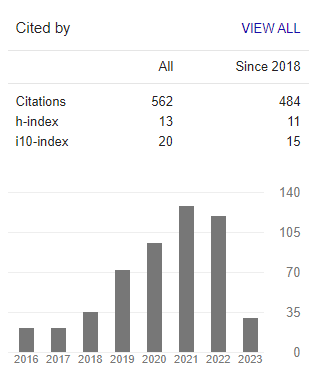THE PROBLEM OF DEEP COMMUNICATION IN CONTEMPORARY ETHICS EDUCATION
Abstract
Contemporary developments in the fields Nanotechnology, Biotechnology, Information Technology and Cognitive Sciences (NBIC) have brought about industrial revolution 4.0 and society 5.0 which promises prospect of dramatic progress in human life but also risks complicated ethical issues and ethical dilemmas. It is therefore important to know how future generations will address these ethical problems and ethical dilemmas. Ethics education for Millennial and Generation Z is currently at stake as they will be the ones who will be involved in the development and application of those sciences and technologies. This research article aims to explore how the problem of declining deep communication essentially occurs in contemporary ethics education. To reach the aim, a traditional literature review in conjunction with qualitative meta-synthesis method was applied. The result shows that effective ethics education requires ethical discussions that take the form of deep communication to link its participants’ value systems. However, rapid development and frenzied use of digital information and communication technology (ICT) tend to influence Millennial and Generation Z more outward-oriented, accustomed to shallow communication, and eventually drown into weakened ability for deep communication. Recommendation to anticipate the problem is to intensively deploy creativity in using the digital information and communication technology (ICT) to provoke the emergence of the power of inward orientation through intrapersonal communication and self-reflection.
To cite this article (7th APA style):
Endro, G. (2022). The problem of deep communication in contemporary ethics education. Journal Communication Spectrum: Capturing New Perspectives in Communication, 12(1), 1-10. http://doi.org/10.36782/jcs.v12i1.2222
Keywords
References
Aicardi, C., Fothergill, B. T., Rainey, S., Stahl, B. C. & Harris, E. (2008). Accompanying technology development in the Human Brain Project: From foresight to ethics management. Futures. https://doi.org/10.1016/j.futures.2018.02.005.
Alsop, R. (2008). The Trophy Kids Grow Up: How the millennial generation is shaking up the workplace. Jossey-Bass.
Beauchamp, T. L. (2003). The Nature of Applied Ethics. In Frey, R. G. & Wellman, C. H. (Eds.), A Companion to Applied Ethics (pp. 1-16). Blackwell Publishing.
Bourke, B. & Mechler, H. S. (2010). A New Me Generation? The Increasing Self-Interest Among Millennial College Students. Journal of College & Character, 11(2), 1-9. DOI: 10.2202/1940-1639.1034.
Bunch, B. & Hellemans, A. (2004). The History of Science and Technology. Houghton Mifflin Company.
Burstein, D. D. (2013). Fast Future: How the Millennial Generations Shaping Our World. Beacon Press.
Canton, J. (2004). Designing the Future: NBIC Technologies and Human Performance Enhancement. Annals of the Lyceum of Natural History of New York, 1013, 186-198. DOI: 10.1196/annals.1305.010.
Cobley, P. (2008). Communication: Definitions and Concepts. In Donsbach, W. (Ed.), The International Encyclopedia of Communication (pp. 660-666). Blackwell Publishing.
Colussi, I. A. (2014). The Role of Responsible Stewardship in Nanotechnology and Synthetic Biology. In Arnaldi, S. et.al. (Eds.), Responsibility in Nanotechnology Development (pp. 53-75). Springer Science+Business Media.
Dance, F. E. X. (1970). The ‘Concept’ of Communication. Journal of Communication, 20, 201-210. DOI: 10.1111/j.1460-2466.1970.tb00877.x.
Deguchi, A., Hirai, C., Matsuoka, H., Nakano, T., Oshima, K., Tai, M. & Tani, S. (2020). What Is Society 5.0?. In Hitachi-UTokyo Laboratory (H-UTokyo Lab.) (Ed.), Society 5.0: A People-centric Super-smart Society (pp. 1-23). SpringerOpen. https://doi.org/10.1007/978-981-15-2989-4
Finfgeld-Connett, D. (2018). A Guide to Qualitative Meta-Synthesis. Routledge and Taylor & Francis Group.
Gert, B. (2020). The Definition of Morality. Stanford Encyclopedia of Philosophy. https://plato.stanford.edu/entries/morality-definition/
Giddens, A. (1991). Modernity and Self-Identity: Self and Society in the Late Modern Age. Polity Press.
Greenberg, E. & Weber, K. (2008). Generation We: How Millennial Youth Are Taking Over America and Changing Our World Forever. Pachatusan.
Grice, P. (1957/1989). Meaning. In Grice, P. (Ed.), Studies in the Way of Words (pp. 213-223). Harvard University Press.
Grice, P. (1969/1989). Utterer’s Meaning and Intentions. In Grice, P. (Ed.), Studies in the Way of Words (pp. 86-116). Harvard University Press.
Harper, D. (2001-2021). “communication”. Online Etymology Dictionary. https://www.etymonline.com/
Jesson, J. K., Matheson, L. & Lacey, F. M. (2011). Doing Your Literature Review: traditional and systematic techniques. SAGE Publications Ltd.
Johnson, D. G. & Noorman, M. (2014). Principles for the Future Development of Artificial Agents. IEEE International Symposium on Ethics in Engineering, Science, and Technology (ETHICS) - Chicago, IL, USA. DOI: 10.1109/ethics.2014.6893395.
Koulopoulos, T. & Keldsen, D. (2014). The Gen Z Effect: The Six Forces Shaping the Future of Business. Bibliomotion.
Lantolf, J. P. (2009). Intrapersonal Communication Theories. In Littlejohn, S. W. & Foss, K. A. (Eds.), Encyclopedia of Communication Theory (pp. 566-569). Sage Publications.
Leonhard, G. (2016). Technology vs. Humanity: The coming clash between man and machine. The Futures Agency.
McGowan, H. E. & Shipley, C. (2020). The Adaptation Advantage: Let Go, Learn Fast, and Thrive in the Future of Work. John Wiley & Sons.
Ng, E. S. W., Schweitzer, L. & Lyons, S. T. (2010). New Generation, Great Expectation: A Field Study of the Millennial Generation. Journal of Business and Psychology, 25(2), 281-292. DOI: 10.1007/s10869-010-9159-4.
Roco, M. C. & Bainbridge, W. S. (Eds.). (2003). Converging Technologies for Improving Human Performance: Nanotechnology, Biotechnology, Information Technology and Cognitive Science. Springer-Science+Business Media.
Salgues, B. (2018). Society 5.0: Industry of the Future, Technologies, Methods and Tools. ISTE and John Wiley & Sons.
Seemiller, C. & Grace, M. (2016). Generation Z Goes to College. Jossey-Bass.
Seemiller, C. & Grace, M. (2019). Generation Z: A Century in the Making. Routledge.
Steinfatt, T. M. (2009). Definitions of Communication. In Littlejohn S. W. & Foss K. A. (Eds.), Encyclopedia of Communication Theory (pp. 295-299). Sage Publications.
Wells, T., Fishman, E. K., Horton, K. M. & Raman, S. P. (2015). Millennial Mind-Set: Pursuing the Next Generation of Consumers. Journal of the American College of Radiology, 12(7), 742-744. DOI: 10.1016/j.jacr.2015.03.031.
Refbacks
- There are currently no refbacks.

This work is licensed under a Creative Commons Attribution 3.0 License.
Indexed by:
Archived in:
Listed in:
INTERNATIONAL ASSOCIATION FOR MEDIA AND COMMUNICATION RESEARCH

















